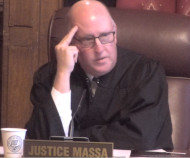11/14/2019
Indiana Supreme Court Considers Whether Removing GPS Tracker Is A CrimeJustices on the Indiana Supreme Court wonder whether removing a secretly installed GPS tracker from your car constitutes theft.

A man who removed a secretly installed GPS tracking device from his SUV is making his case to the Indiana Supreme Court. Justices last week heard the case of Derek Heuring, who had a warrant-authorized tracker placed on his 1999 Ford Expedition by the Warrick County Sheriff's Office on July 11, 2018.
Heuring removed the unmarked box from his vehicle and left it in the family barn. Police eventually became suspicious that the GPS location readings were showing the car as always being parked in the same location. Then the device went dark. Detectives went to the barn to retrieve the tracking device from the car, but it was no longer attached. Based upon this, police applied for warrants to search Heuring's home and that of his parents to find the missing GPS tracker. The warrant application asserted that Heuring had committed "theft" by removing the unidentified, magnetically attached six inch by four inch black box from his car.
While looking through the barn, officers found a meth pipe, which was used to obtain a warrant to search for drugs. During this search, the tracker was found in a locker in the barn. Justice Mark S. Massa wondered whether it could ever be a crime to remove such a device from your own car.
"I'm not looking to make things easier for drug dealers," Justice Massa said. "But if something is left on your car -- even if you know it's the police that are tracking you -- you have an obligation to leave it there and let them track you? If you then take it off you're somehow subject to a search of your home?"
Justice Steven H. David was equally skeptical.
"If someone wants to find me to do harm to me -- and it's not the police -- and they put a tracking device on my car, and I find it and dispose of it after stomping on it twenty-five times, I would hope they would not be able to go to a local prosecutor and somehow I'm getting charges filed against me for destroying someone else's property," Justice David said.
Heuring's attorney Michael Keating argued the police could not allege theft if there was no way for his client to know who owned the tracking device. Keating suggested police could have placed a label on the device indicating ownership, or officers could have come to the door and asked Heuring for the device back. Prosecutors countered that police acted with judicial authorization at every step of the investigation. The justices will issue a final ruling deciding whether the "theft" search warrant was properly issued.


